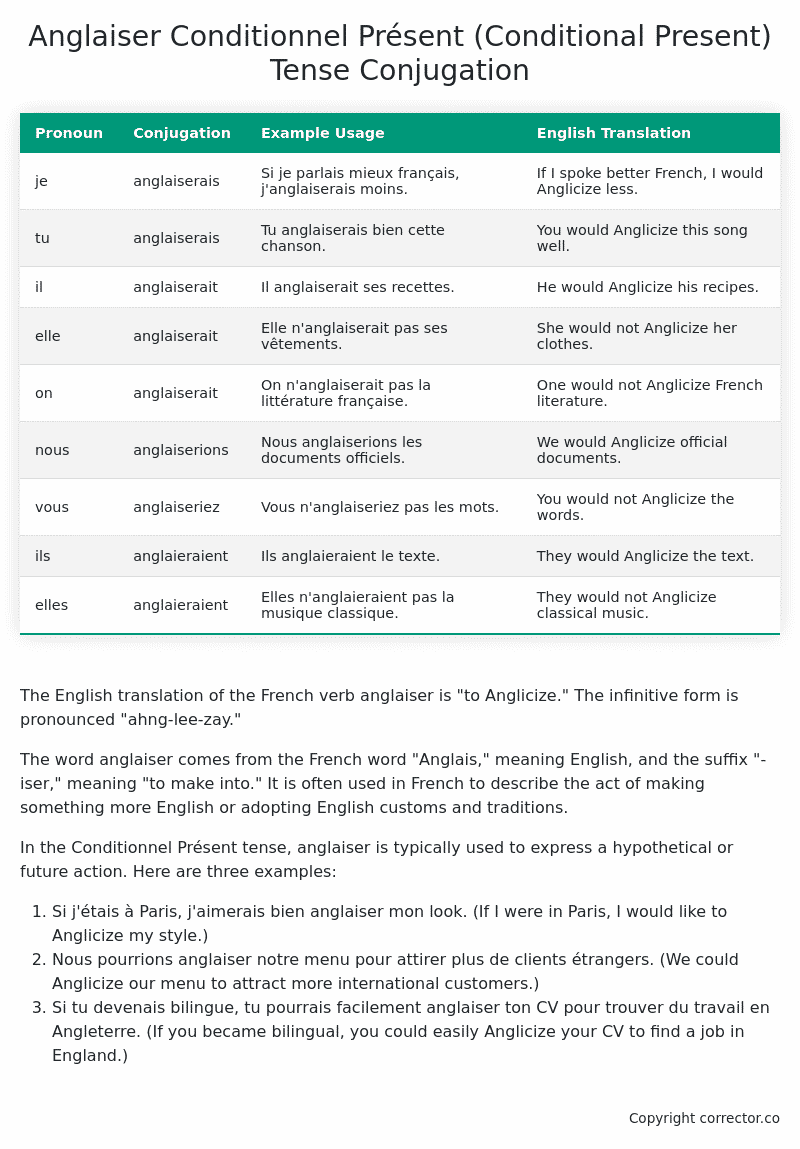Conditionnel Présent (Conditional Present) Tense Conjugation of the French Verb anglaiser
Introduction to the verb anglaiser
The English translation of the French verb anglaiser is “to Anglicize.” The infinitive form is pronounced “ahng-lee-zay.”
The word anglaiser comes from the French word “Anglais,” meaning English, and the suffix “-iser,” meaning “to make into.” It is often used in French to describe the act of making something more English or adopting English customs and traditions.
In the Conditionnel Présent tense, anglaiser is typically used to express a hypothetical or future action. Here are three examples:
- Si j’étais à Paris, j’aimerais bien anglaiser mon look. (If I were in Paris, I would like to Anglicize my style.)
- Nous pourrions anglaiser notre menu pour attirer plus de clients étrangers. (We could Anglicize our menu to attract more international customers.)
- Si tu devenais bilingue, tu pourrais facilement anglaiser ton CV pour trouver du travail en Angleterre. (If you became bilingual, you could easily Anglicize your CV to find a job in England.)
Table of the Conditionnel Présent (Conditional Present) Tense Conjugation of anglaiser
| Pronoun | Conjugation | Example Usage | English Translation |
|---|---|---|---|
| je | anglaiserais | Si je parlais mieux français, j’anglaiserais moins. | If I spoke better French, I would Anglicize less. |
| tu | anglaiserais | Tu anglaiserais bien cette chanson. | You would Anglicize this song well. |
| il | anglaiserait | Il anglaiserait ses recettes. | He would Anglicize his recipes. |
| elle | anglaiserait | Elle n’anglaiserait pas ses vêtements. | She would not Anglicize her clothes. |
| on | anglaiserait | On n’anglaiserait pas la littérature française. | One would not Anglicize French literature. |
| nous | anglaiserions | Nous anglaiserions les documents officiels. | We would Anglicize official documents. |
| vous | anglaiseriez | Vous n’anglaiseriez pas les mots. | You would not Anglicize the words. |
| ils | anglaieraient | Ils anglaieraient le texte. | They would Anglicize the text. |
| elles | anglaieraient | Elles n’anglaieraient pas la musique classique. | They would not Anglicize classical music. |
Other Conjugations for Anglaiser.
Le Present (Present Tense) Conjugation of the French Verb anglaiser
Imparfait (Imperfect) Tense Conjugation of the French Verb anglaiser
Passé Simple (Simple Past) Tense Conjugation of the French Verb anglaiser
Passé Composé (Present Perfect) Tense Conjugation of the French Verb anglaiser
Futur Simple (Simple Future) Tense Conjugation of the French Verb anglaiser
Futur Proche (Near Future) Tense Conjugation of the French Verb anglaiser
Plus-que-parfait (Pluperfect) Tense Conjugation of the French Verb anglaiser
Passé Antérieur (Past Anterior) Tense Conjugation of the French Verb anglaiser
Futur Antérieur (Future Anterior) Tense Conjugation of the French Verb anglaiser
Subjonctif Présent (Subjunctive Present) Tense Conjugation of the French Verb anglaiser
Subjonctif Passé (Subjunctive Past) Tense Conjugation of the French Verb anglaiser
Subjonctif Imparfait (Subjunctive Imperfect) Tense Conjugation of the French Verb anglaiser
Subjonctif Plus-que-parfait (Subjunctive Pluperfect) Tense Conjugation of the French Verb anglaiser
Conditionnel Présent (Conditional Present) Tense Conjugation of the French Verb anglaiser (this article)
Conditionnel Passé (Conditional Past) Tense Conjugation of the French Verb anglaiser
L’impératif Présent (Imperative Present) Tense Conjugation of the French Verb anglaiser
L’infinitif Présent (Infinitive Present) Tense Conjugation of the French Verb anglaiser
Struggling with French verbs or the language in general? Why not use our free French Grammar Checker – no registration required!
Get a FREE Download Study Sheet of this Conjugation 🔥
Simply right click the image below, click “save image” and get your free reference for the anglaiser Conditionnel Présent tense conjugation!

Anglaiser – About the French Conditionnel Présent (Conditional Present) Tense
Formation
Common Everyday Usage Patterns
Expressing Polite Requests
Expressing Hypothetical Situations
Expressing Doubt or Uncertainty
Interactions with Other Tenses
Present Tense
Past Tense
Future Tense
Conditional Perfect
Summary
Want More?
I hope you enjoyed this article on the verb anglaiser. Still in a learning mood? Check out another TOTALLY random French verb conjugation!


